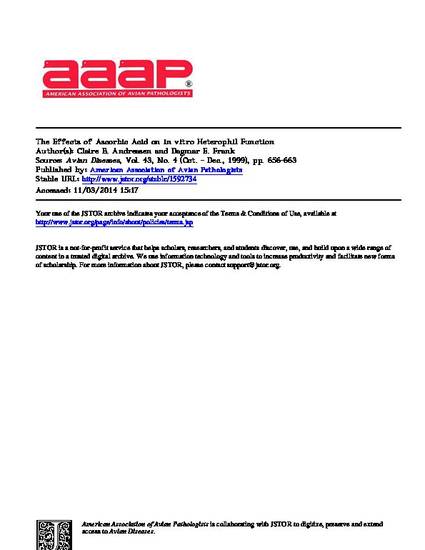
Article
The Effects of Ascorbic Acid on In Vitro Heterophil Function
Avian Diseases
Document Type
Article
Disciplines
Publication Date
1-1-1999
DOI
10.2307/1592734
Abstract
As a feed additive, ascorbic acid has been shown to have a protective effect against bacterial and viral diseases and to reduce the impact of detrimental stress in chickens. This study examined the effect of ascorbic acid treatment on in vitro heterophil function by examining random migration and phagocytosisa nd bacterialk illing of Staphylococcuasu reus. Heterophils were evaluated in broiler chickens ranging from 5 to 16 wk of age, and age differences were seen. Significant increases in bacterial killing were found in heterophils treated with ascorbic acid, and this difference tended to be greater in chickens from 5 to 10.5 wk of age. No significant differences were found in phagocytosis or random migration, but ascorbic acid tended to decrease random migration. The most significant effect on in vitro heterophil function was an increase in bacterial killing.
Copyright Owner
American Association of Avian Pathologists
Copyright Date
1999
Language
en
File Format
application-pdf
Citation Information
Claire B. Andreasen and Dagmar E. Frank. "The Effects of Ascorbic Acid on In Vitro Heterophil Function" Avian Diseases Vol. 43 Iss. 4 (1999) p. 656 - 663 Available at: http://works.bepress.com/claire_andreasen/15/

This article is from Avian Diseases 43 (1999): 656-663, doi:10.2307/1592734. Posted with permission.